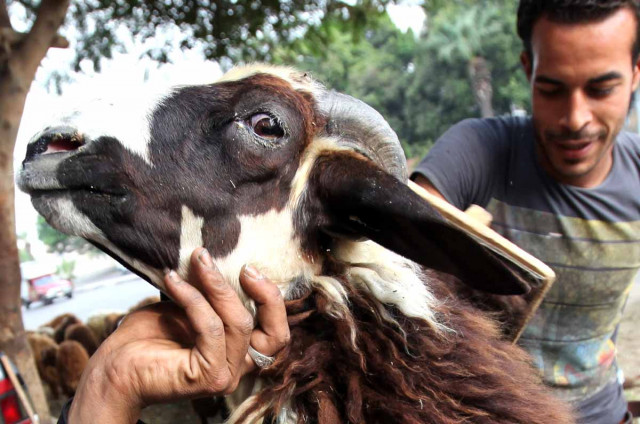More animals slaughtered in twin cities this Eid
More animals were sacrificed by NGOs for the flood and earthquake affected people.

This Eidul Azha, there was a 10 percent increase in animal sacrifices as compared to last year in the twin cities of Rawalpindi and Islamabad, according to the Pakistan Butchers Welfare Association (PBWA).
Talking to The Express Tribune, PBWA President Khurshid Qureshi said that although individual sacrifices were fewer this year in the twin cities as compared to last year, the increase, however, is due to the large number of sacrificial animals slaughtered by non-governmental organisations (NGOs).
The organisations each slaughtered around 400 to 450 goats and bulls and distributed the meat among affected people in the flood and previously earthquake-hit areas on Eid.
Qureshi said that due to high prices of sacrificial animals, many people who used to prefer individual sacrifice were compelled to opt for collective sacrifices as they were unable to afford the prices of animals and other related expenses.
Qureshi said that the prices of animal hides also increased this year, varying from texture and condition.
Hides goats, lambs and sheep were sold for Rs200 to Rs600, while hides of bulls were sold for Rs2,000 to Rs4,000.
He added that the number of sacrificial animals in the twin cities’ cattle markets were also fewer as compared to last year.
A resident of Rawalpindi, Anjum Nauman, told The Express Tribune that the since last two years he has been unable to buy an animal due to their high prices and instead opted for collective sacrifice.
“It becomes difficult for me and my wife to explain my children why we are not buying a goat to sacrifice on Eid.
They see other children taking their animals out for grazing and they want to be part of the festivity,” he said.
Some locals also decided to postpone their purchase of a sacrificial animal till the second day of Eid, hoping that the prices of the animals would decrease then.
Published in The Express Tribune, November 11th, 2011.



















COMMENTS
Comments are moderated and generally will be posted if they are on-topic and not abusive.
For more information, please see our Comments FAQ